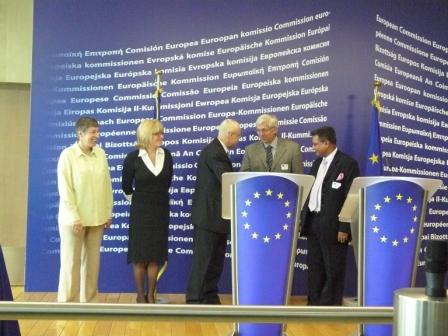Agreement on the directive on prevention from sharp injuries
Joint press release
HOSPEEM – EPSU on the agreement on the directive on prevention from sharp injuries
The European Hospital and Healthcare Sector Social Partners – The European Federation of Public Service Unions (EPSU) and the European Hospital and Healthcare Employers’ Association (HOSPEEM) welcomed the decision of the Council which adopted the directive on prevention from sharp injuries in the hospital and healthcare sector today. The agreement between the European Social Partners in the hospital and healthcare sector signed on 17 July 2009 has become law. Now the European Member States have three years to implement the requirements set out by the directive.
Godfrey Perera, Secretary General of HOSPEEM said that, “the Directive is a fundamental step toward the improvement of health and safety of patients, workers and employers in the hospital and healthcare sector. Indeed, when implemented it will diminish the occurrence of accidents and infections. We are conscious that this problem cannot be eliminated completely, but we are keen to make sure there are appropriate procedures in place to try to reduce the number of injuries by as much as possible. The use of risk assessment, prevention, protection and training procedures will help to achieve this result.”
“This is a major break-through,” Carola Fischbach-Pyttel, General Secretary of EPSU said, “With this directive EPSU and HOSPEEM have laid an important basis to create the safest possible working environment to prevent workers’ injuries caused by all medical sharps. We stress that a well trained, adequately resourced and secure health service workforce is essential to underpin that objective.”
For further information, please contact:
HOSPEEM: Federica BENASSI +32 2 229 21 57 | E-mail: hospeem@hospeem.eu
EPSU: Carola Fischbach-Pyttel +32 2 250 10 91 | E-mail: cfischbach@epsu.org
HOSPEEM is the European Hospital and Healthcare Employers Association. It regroups at European level national , regional and local employers’ associations operating in the hospital and health care sector and delivering services of general interest, in order to co-ordinate their views and actions with regard to a sector and a market in constant evolution. HOSPEEM is an individual member of CEEP.
EPSU is the European Federation of Public Service Unions. It is the largest federation of the ETUC. 8 million public service workers from over 200 trade unions are members. They organise workers in the energy, water and waste sectors, health and social services and local and national administration.






Recent Comments